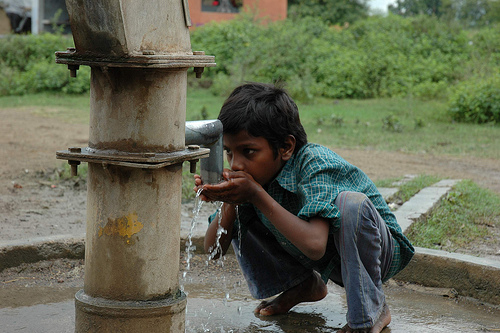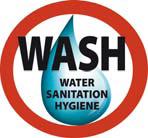/topics/sanitation-and-hygiene
Sanitation and Hygiene
Seven Steps to Hygiene - An educational booklet by Utthan
Posted on 25 Aug, 2010 09:22 AMThis document is an educational booklet on sanitation and hygiene published by Utthan, which works towards empowering women's groups to seek clean and adequate quality of water for all.
The booklet includes the details of seven steps that can be undertaken to attain sanitation and hygiene. The details have been explained in a manner that is simple and understandable and includes illustrations that are self explanatory and easy to follow.
The seven steps include:
- Use and protection of water sources
- Managing drinking water
Emerging groundwater crisis in urban areas – A case study of Bangalore city
Posted on 16 Aug, 2010 07:14 AMThe paper by the Institute for Social and Economic Change documents the case of Ward No. 39 situated at the outskirts of the Bangalore city to understand the emerging groundwater crisis due to overdraft in urban areas. Bangalore has no perennial river, which resulted in the growth of many lakes, acting as a source of groundwater recharge earlier.
UN General Assembly s resolution on water and sanitation as a human right
Posted on 13 Aug, 2010 05:00 PMThe recent UN General Assembly Resolution on declaring water and sanitation as human right is or can be a powerful impetus to securing universal access to water and sanitation for people everywhere. This is the most recent in a string of initiatives to advance the provision of these essential services. Beginning with the UN Decade of Water in the eighties, then the declaration of the Millennium Development Goals, and later the adoption of General Statement 15 by the Economic and Social Council of the United Nations in 2002 the recognition of the fundamental importance of water (and more recently sanitation) to life, health and well being has been accepted at the international level. In India, while there is no specific mention of the right to water in the Constitution, the Supreme Court in its judgement(s)has upheld this as part of the right to life. Some organizations are working to make this a fundamental right, to remove any ambiguity.

Boy drinking water from handpump in Guna, Madhya Pradesh - Handpumps and wells are still one of the major source of drinking water in India.
Photo credits: Anil Gulati
Water Jobs via DevNetJobsIndia.org dated August 11th, 2010
Posted on 11 Aug, 2010 04:21 PMContent Courtesy: DevNetJobsIndia
- Program Associate (Drinking Water and Sanitation)
Coastal Salinity Prevention Cell
Location: Ahmedabad
Last Date: August 11, 2010
Floods, drinking water contamination, mining and waterbodies, water bills, water conflicts - News roundup (1-7 August 2010)
Posted on 07 Aug, 2010 04:51 PMFloods: lessons to be learnt from the massive flooding in Surat city
A report by IIM criticises the way in which dams are managed in the country and calls for the need to apply Management Science / Operations Research techniques and information technology to improve dam management and prevention of floods
Status of urban water supply, sanitation and solid waste management - CPHEEO data (2005)
Posted on 06 Aug, 2010 11:11 AMThis link on the Central Public Health and Environmental Engineering Organisation (CPHEEO) website, presents data related to the status of the urban water, sanitation and solid waste management in India. The data includes information on:
- Status of water supply (physical)
- Status of urban water supply (financial)
- Status of urban sewerage/sanitation system
- Status of low cost sanitation
- Status of solid waste management
Data is included from different states in India namely Assam, Arunachal Pradesh, Karnataka, Gujarat, Maharashtra, Mizoram, Pondicherry, Sikkim and Tamilnadu respectively.
Deaths due to water pollution
Posted on 02 Aug, 2010 02:38 PMDeaths due to water pollution occur mainly as a consequence of drinking of contaminated water. The common diseases caused by consumption of contaminated water are Cholera, Viral Hepatitis, Enteric Fever (Typhoid) and Acute Diarrhoeal Diseases (ADD).
The number of deaths reported State-wise on account of Cholera, Viral Hepatitis, Enteric Fever (Typhoid) and Acute Diarrhoeal Diseases (ADD) for the years 2007, 2008 and 2009 are given in Annexure – I-III.
India WASH forum e-newsletter - Update 13 July 2010
Posted on 02 Aug, 2010 11:56 AMWe see this newsletter as a platform for independent credible voice in the water and sanitation sector. Our emphasis is on bringing together critical news and information with analysis. In this issue we share news and analysis on topical issues and developments.
The Department of Drinking Water and Sanitation(DDWS) has simultaneously invited inputs to Discussion Papers on Drinking Water and Sanitation, circulated on Solution Exchange. Inputs given by India WASH Forum, on this, is enclosed in this Update. We have pointed out the missing elements of sanitation improvement strategy that include, criticality of providing water as an inseparable component to household sanitation, the tendency to see behavior change as a lifestyle issue and not linked to the hardware components, peoples livelihoods and living conditions. Suggestions for what needs to be done to strengthen the implementation mechanism of the flagship sanitation programme(TSC) and partnerships.
Step by step: Achieving sustainable sanitation - Lessons from civil society experiences - A report by Arghyam
Posted on 29 Jul, 2010 02:19 AMSeveral concerns were raised during the discussions on the the manner in which the Total Sanitation Campaign (TSC) was being implemented, followed by identification of steps that were needed to ensure social, technical, institutional, financial and environmental sustainability of the programme.
The discussions revealed that:
- The TSC indeed led to the mainstreaming of sanitation in India. However, more emphasis was placed on hardware targets, while social mobilisation had been largely ignored. Thus, inspite of increase in the coverage of toilets, their usage and sustainability had remained low.

5th Global YES Summit, Rework The World - A trip report
Posted on 26 Jul, 2010 11:17 PMHad the opportunity to attend a recent worldwide gathering on the topic of youth and social entrepreneurship, which gave much food for thought. The event was the 5th Global YES Summit, entitled “ReWork The World”. Details of the gathering are at www.reworktheworld.org . The message there was that we need to do something radical in order to find productive work for the vast numbers of youth coming into the workforce especially in developing nations. The new jobs cannot be of the old variety, they need to be green, sustainable jobs. In other words, we need to ‘rework the world’. The conference was based on the premise that these new jobs will come out of social entrepreneurship.






